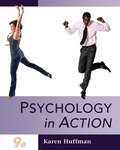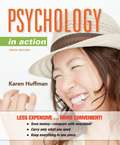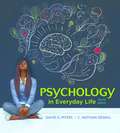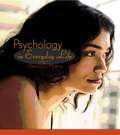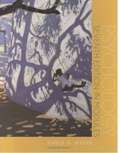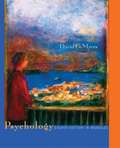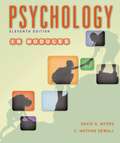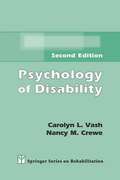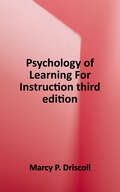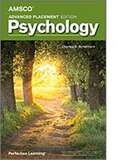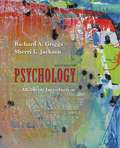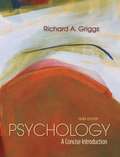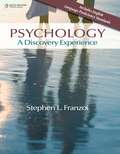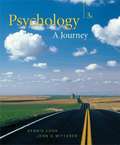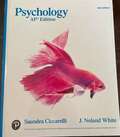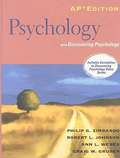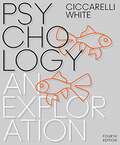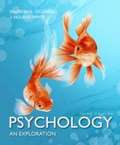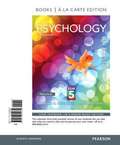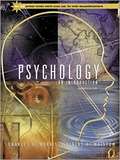- Table View
- List View
Psychology in Action (9th Edition)
by Karen HuffmanHuffman (Palomar College) introduces students to the basic foundations of psychology by incorporating life applications and active learning. This edition, which focuses on the theme of living better, has new sections with new and expanded coverage of how to live better at home, work, or school, in relationships, and in the world. It has additional applications, two optional chapters on industrial/organizational psychology and psychology in a global economy, a focus on visual learning and American Psychological Association-linked learning objectives, and expanded gender and cultural diversity and critical thinking/active learning exercises. Online access to the full text and other features is included.
Psychology in Action 10th Edition
by Karen HuffmanThis flagship book's 10th edition helps students examine their own personal studying and learning styles with several new pedagogical aids -- encouraging students to apply what they are learning to their everyday lives.
Psychology in Everyday Life, 1st edition
by David G. MyersLEARN IT. LIVE IT. Why take psychology? What makes psychology a science? Can it really help me understand my feelings and behaviors? Or how I get along with family and friends? Now from the world's foremost author for the introductory psychology classroom comes a new textbook that makes learning about the psychology of our lives a captivating experience for students at all levels. Carried by the author's acclaimed empathetic voice, Psychology in Everyday Life is David Myers' most inviting text to date. This new book represents a breakthrough in the interplay of text and visuals, yet, as always, provides a rich source of scientific insights into the lives we live. Any student, regardless of age or background, will find it a text that speaks directly to him or her, and will embrace it not just for its grade-raising potential, but for its revelations about what makes a person a stronger student, a more tuned-in friend or partner, a more effective worker, or a wiser parent.
Psychology in Modules (7th Edition)
by David G. MyersThe unique feature of this book is that it contains 55-module text on psychology in an easily digestible capsule format.
Psychology in Modules (8th Edition)
by David G. MyersThis eighth modular edition of David G. Myers' 'Psychology' includes expanded coverage of the most recent developments in the dynamic fields of cognitive science, neuroscience, cultural and gender diversity, and industrial/organizational psychology.
Psychology in Modules, 11th Edition
by David G. Myers C. Nathan DewallIn this version of Psychology, Eleventh Edition, David Myers and Nathan DeWall break down the new edition's 16 chapters into 55 modules, assignable in any sequence and brief enough to be read in one sitting. It's a format favored by a wide range of students and instructors, one that's supported by substantial research showing that shorter reading assignments are more easily absorbed than longer ones.The new edition of Modules includes the same new features and content of Psychology, Eleventh Edition, and like that text, is more than ever a fully integrated text/media learning package. New features (How Would You Know; Assess Your Strengths) move students from reading the chapter to actively learning online. Those features and more are included in the book's dedicated version of Worth Publishers' breakthrough online course space, LaunchPad, which brings together a fully integrated e-Book, LearningCurve adaptive quizzing, a rich collection of student media resources, and easy setup, assessment, and course management options for instructors. What's in the LaunchPad
Psychology of Disability (2nd edition)
by Nancy M. Crewe Carolyn L. VashThe latest edition, 20 years after the first, incorporates the many changes that have occurred in disability-related language, legislation, technology, and research. Its two sections focus first on the disability experience a chronicle of what it's like to be disabled and how objective and subjective experiences affect the basic functions of living, working, and playing and then on interventions a response to the problems and sources of psychological pain exposed by the discussions in the first section. Vash (a writer and consulting psychologist in Altadena, Calif. ) and Crewe (Michigan State U. ) see their work as both a textbook or collateral reading source for those studying the psychological aspects of disability, and a general resource for rehabilitation professionals.
Psychology of Learning for Instruction
by Marcy P. DriscollThe Third Edition of this popular text continues its in-depth, practical coverage with a focus on learning and instruction that presents the latest psychological and educational models and research to the students of today's learning society. <p><p>This book focuses on the applications and implications of the learning theories. Using excellent examples ranging from primary school instruction to corporate training, this text combines the latest thinking and research to give students the opportunity to explore the individual theories as viewed by the experts. Students are encouraged to apply "reflective practice," which is designed to foster a critical and reflective mode of thinking when considering any particular approach to learning and instruction.
Psychology, AMSCO®, Advanced Placement® Edition
by Laura Brandt Mike HamiltonNIMAC-sourced textbook
Psychology, AP Edition (2nd Edition)
by Saundra K. Ciccarelli J. Noland WhiteThis book introduces students to psychology--its history, its breadth, its mysteries, and its applications. This AP* Edition provides some exciting new tools to help students prepare for and succeed on the AP Psychology Exam, including a correlation to the College Board's AP Psychology topics and learning objectives, along with quizzes and chapter tests with questions formatted like those students will experience on the AP Exam.
Psychology: A Concise Introduction
by Richard A. Griggs Sherri L. JacksonThis exceptionally concise volume offers a rich survey of the field’s fundamental research and concepts. The text also includes a robust media and supplements package for instructors and students, including LaunchPad. Richard Griggs has updated the book throughout, especially in the chapters on neuroscience, sensation and perception, learning, social psychology, and abnormal psychology—all while maintaining the book’s trademark brevity.
Psychology: A Concise Introduction (Third Edition)
by Richard A. GriggsThis text explores the territory of the introductory psychology course with both brevity and clarity. Griggs draws on his classroom experience and extensive research in his choice of the core concepts in psychology.
Psychology: A Discovery Experience
by Stephen L. FranzoiNIMAC-sourced textbook <p><p> PSYCHOLOGY: A DISCOVERY EXPERIENCE is designed specifically for high school students and is written to the American Psychological Association (APA) National Standards for High School Psychology. Targets English Language Learners with Essential Question activities that facilitate listening, speaking, reading, and writing skills. Stephen Franzoi's conversational writing style guides students through a journey of self-discovery. Students will learn and apply concepts of psychology to their everyday lives with the latest developments in psychology, fascinating interactive figures, in-text labs, career insights, and an online database of current psychology resources. These tools make this the most relevant and accessible high school psychology program on the market. The comprehensive instructor resource package includes the Instructor Wraparound Edition, Instructor Resource CD, lesson plans, PowerPoint Presentations with embedded interactive figures, ExamView Computerized Test Generator, DVD collection, and an online database of current psychology resources.
Psychology: A Journey
by Dennis Coon John O. MittererIn a course where professors are frequently confronted by students who haven't actually read their textbooks, this text offers a solution. The shortest, most succinct of the books written by Dennis Coon, PSYCHOLOGY: A JOURNEY presents psychology in a way that sparks readers' curiosity, insights, imagination, and interest getting students "hooked" on psychology and eager to read on. The first author to integrate the proven SQ4R (survey, question, read, recite, relate, and review) active learning system into a psychology textbook, Coon helps readers grasp major concepts, develop a broad understanding of psychology's diversity, and see for themselves how psychology relates to the challenges of everyday life. Because readers become actively involved with the material, they develop a basic understanding of psychology that they take with them into their future courses and careers.
Psychology: A Way to Grow (Second Edition)
by Carl R. Green William R. SanfordPsychology: A Way to Grow, Revised Second Edition, introduces high school students to psychology. It provides its readers with a foundation in the basic theories and principles of psychology. It also guides students toward a greater understanding of their own capacity for personal growth.
Psychology: AP Edition
by Saundra K. Ciccarelli J. Noland WhitePsychology AP Edition 6th Edition Textbook.
Psychology: AP Edition with Discovery Psychology
by Philip G. Zimbardo Robert L. Johnson Ann L. Weber Craig W. GruberPsychologists have set the standard for the methodology and scientific study of behaviors and mental processes. By making the empirical approach the standard for all psychological research, psychologists have been able to conduct studies that have changed the way we think. Giving you a more complete explanation of what we mean by the science of psychology will occupy much of the rest of the chapter. For the moment, we want to focus on a point that is only implied in our definition of psychology: the notion that psychology is not mere speculation about human nature, nor is it a body of folk wisdom about people that "everybody knows" to be true. Throughout this book you will find many examples of such "commonsense" ideas that psychological science has shown to be false.
Psychology: AP Version (Seventh Edition)
by Jared BernsteinSeventh edition has an increased amount of material on applied psychology without losing the book's emphasis on basic research in psychology. Also contains substantial material on culture and human diversity.
Psychology: An Exploration
by Saundra Ciccarelli J. WhiteFor courses in Introductory Psychology. <p><p>The most learner-centered and assessment-driven brief text available. <p><p>Throughout Psychology: An Exploration , 4th Edition, Saundra Ciccarelli and J. Noland White employ a learner-centered, assessment-driven approach that maximizes student engagement, and helps educators keep students on track. In this brief text, the authors draw students into the discipline by showing how psychology relates to their own lives. Clear learning objectives, based on the recommended APA undergraduate learning outcomes, guide students through the material. And assessment tied to these learning objectives lets students check their understanding, while allowing instructors to monitor class progress and intervene when necessary to bolster student performance.
Psychology: An Exploration (3rd Edition)
by Saundra K. Ciccarelli J. Noland WhiteNow in its third edition, Psychology: An Exploration draws students into the discipline by showing how psychology relates to their own lives. Clear learning objectives, based on the recommended APA undergraduate learning outcomes, guide students through the material. And assessment tied to these learning objectives lets students check their understanding, while allowing instructors to monitor student progress and intervene when necessary to bolster student performance.
Psychology: An Exploration with DSM5 Update
by J. Noland White Saundra CiccarelliUsing the most recent recommended APA undergraduate psychology learning outcomes, the authors establish clear learning objectives for students that are tied to these objectives. Student and instructors praise Ciccarelli and White's approach to teaching and learning in today's classroom. The thirteen-chapter table of contents covers the essentials that every introductory psychology student should know and fits easily into a one-semester course.
Psychology: An Introduction
by Charles G. Morris Albert A. MaistoThis best-selling book on introductory psychology is headlined by the contributions of co-author Al Maisto, the Carnegie Foundation's College Professor of the Year. The close collaboration of master author Charles G. Morris with Al Maisto keeps Psychology: An Introduction at the cutting edge of the discipline through the use of relevant material and recent examples. Classic studies are carefully integrated with the most up-to-date research to provide readers with an accurate and current view of the field. <P><P>The book presents introductory psychology as a science and as a diverse discipline, with a focus on critical thought and analysis of ideas—and a keen eye on how new technology can enhance the teaching and learning experience. Chapter topics include the biological basis of behavior, sensation and perception, consciousness, learning, memory, cognition and language, intelligence and mental abilities, motivation and emotion, life span development, personality, stress and health psychology, psychological disorders, therapies, and social psychology. For individuals looking for a thorough and appealing introduction to psychology.
